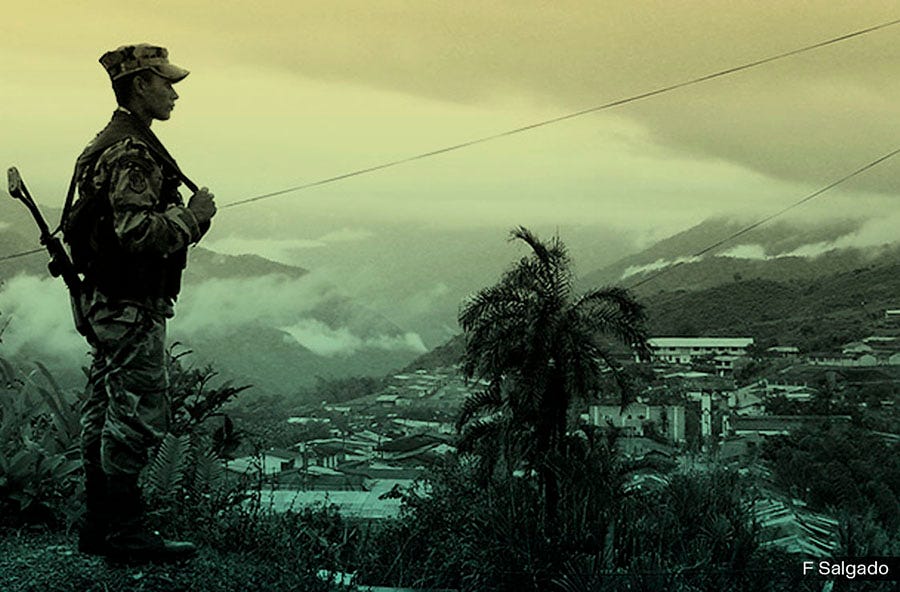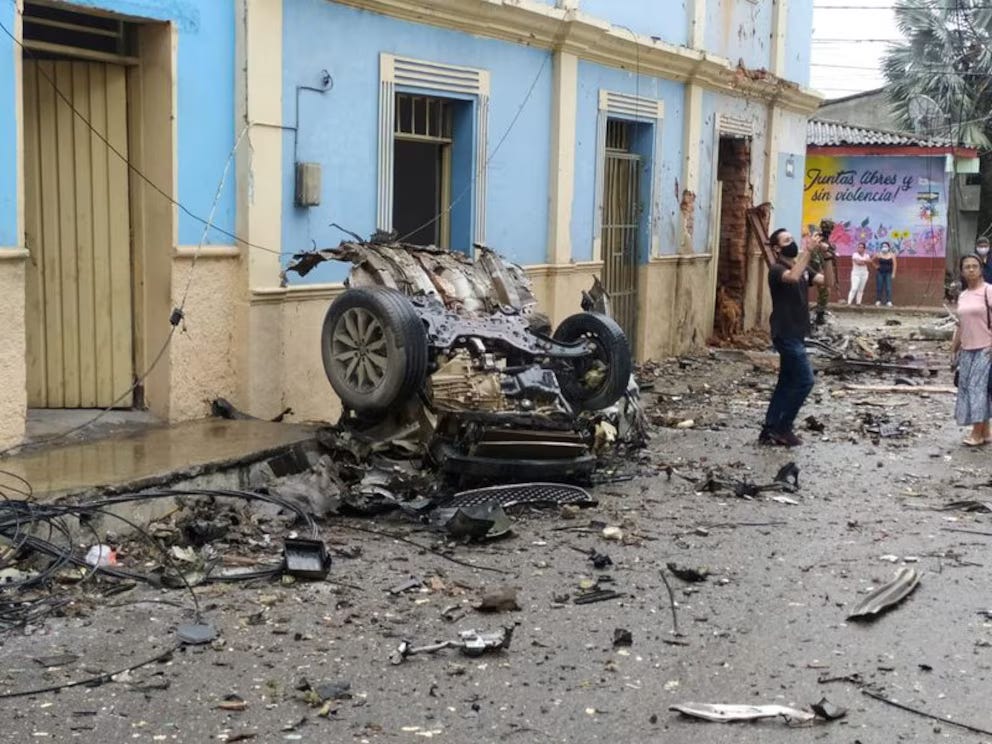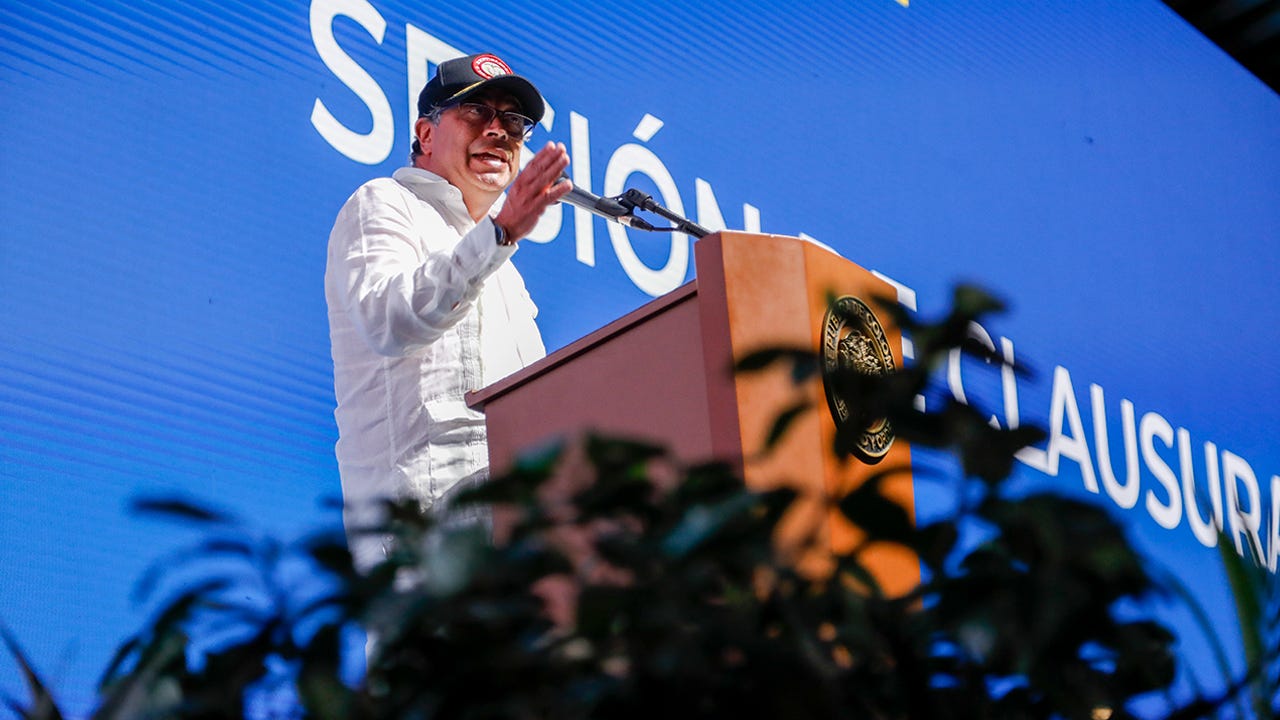Is "total peace" in Colombia headed for total collapse?
Human rights groups say a series of bombings, regional offensives and attempted assassinations represent a "miserable unravelling" of peace-building efforts
Colombian attempts at peacebuilding have suffered a devastating series of setbacks in recent months: an attempted murder on a presidential pre-candidate, a wave of 24 bombing and gunfire attacks on police and military stations in Cauca and Valle deCauca, and an astonishing tactical victory by the largest remaining rebel group, the National Liberation Army (ELN) in the east of the country.
President Gustavo Petro promised during the election to bring “Total Peace” to the country through negotiations with armed groups, but he has had mixed successes. The government is in talks with 10 non-state armed groups. Meanwhile, ceasefires granted with the largest groups in the country, like the ELN, and the Gaitanistas, have fallen apart— as have negotiations with FARC dissident group Estado Mayor Central (EMC).
Child recruitment and extortion in conflict zones is rising, as is the power of groups like the Gaitanistas, in the north of the country, and the ELN — who after a dramatic offensive in Catatumbo, are now the effective hegemonic power in the Venezuelan-Colombian borderlands.
Colombia is also the most dangerous country in the world for social leaders and environmental activists. Seventy-four have been killed so far, according to Indepaz, a human rights watchdog.
Juanita Goebertus, Americas director at Human Rights Watch, in response to the coordinated attacks on police stations this week, said the offensive is “a consequence of the Petro administration’s failed ‘total peace’ policy. The absence of effective security and justice measures has allowed armed groups to expand their presence and increase their ability to cause harm, even in major cities.”
EMC is believed to be responsible for the attacks.
The ELN is now a regional power in Venezuela and the borderlands
In January, one of the few successes of “total peace” exploded in a dramatic fashion. At the beginning of his term, Petro’s government had ushered in a ceasefire between rival armed groups in Catatumbo, a region along the border with Venezuela.
on 16 January, however, the ELN launched a coordinated offensive against dissidents of the former FARC known as the Estado Mayor de los Bloques, killing dozens of fighters from the group and displacing thousands of residents in Catatumbo.
Petro called off peace talks with the ELN and declared a “state of emergency” in the following days, but ELN seized the momentum to launch additional offensives in Colombia’s Amazon and central regions.
International Crisis Group, in late January, wrote that the actions represented “a miserable unravelling” of the limited progress “total peace” has achieved. “Alarmingly,” continues Crisis Group, “many of the armed groups involved in combat are also sitting in peace talks with the government.”
Peacebuilding experts have long pointed to the difficulties of offensives by armed groups, such as those carried out ELN in the east of the country, bring to negotiations. If a criminal group engaged in talks with the government, doesn’t believe that security forces can protect them, they are much less likely to disarm.
An assassination attempt roils Colombia’s elites
On July 8, far-right senator and leader of the Centro Democrático party, Miguel Uribe Turbay, was shot twice in the head at a campaign event. The attempted murder called up memories of Colombia’s dark past, at the height of the civil war, when political assassinations were more commonplace.
The murder attempt prompted condemnations from across both the civilian sector and the political spectrum, including from the party of Petro.
Politicians and the richest members of society, however, have expressed particular outrage. Uribe is the son of an ex-president, a protege of Alvaro Uribe, who has a long history with paramilitary forces that committed grave human rights offenses during Colombia’s civil war.
Many have blamed Petro for what they call polarizing rhetoric as a factor in the attempted killing, which some have claimed is political. But evidence so far suggests the tactics of organized crime groups more than professional assassins. The gunman detained by police is 15 years old — a common tactic of narcos in the country.
Violence is not an uncommon occurrence during elections in Colombia. During gubernatorial and local elections in 2023, 18 candidates were killed in two months. Right-wing politicians who rarely speak of the candidates killed in rural areas, or of the deaths of social leaders in conflict zones, however, have expressed outrage that violence has touched one of their allies.
Looking beyond federal efforts towards local peace processes
As the national government struggles with numerous setbacks, many proponents of peace-building in the country are looking towards more local processes. Medellin, Buenaventura, and Bogotá all have ongoing processes with smaller local criminal groups that will continue beyond the Petro administration.
Many rural communities in conflict areas, frustrated by a lack of progress by the Petro administration, have also taken to independent peace-building processes.
Negotiations by smaller armed groups with the national government have also made progress, most notably in Nariño, in the south of the country. In the meantime, the government is giving a freer hand to security forces as they battle against criminal groups.
Last year, Petro declared “total war” against EMC and resumed military operations against the ELN and the Gaitanistas. But the offensives by military forces against some criminal groups have left a security vacuum in other conflict regions.
A mid-level officer, explaining the situation to the International Crisis Group in January: “It is painful, but we have to admit that the threats have overtaken our ability to combat them. And if tomorrow there are no more negotiations, we will not have the capacity for a military response”.
You can also donate a one-time gift via “Buy Me a Coffee”. It only takes a few moments, and you can do so here.
And if you can’t do any of that, please do help us by sharing the piece! We don’t have billionaire PR teams either. haha




